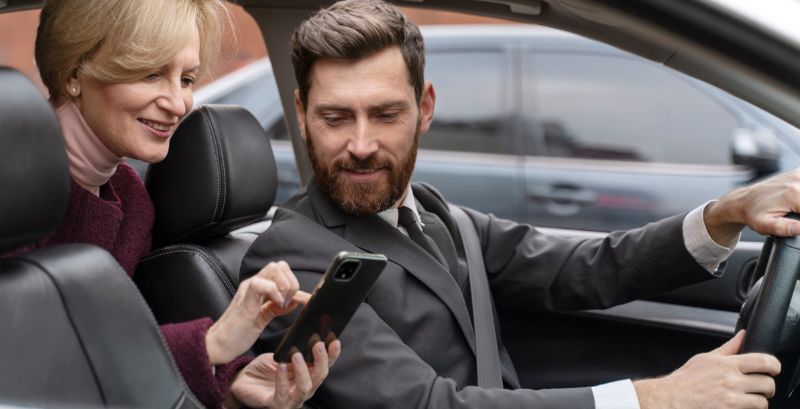Boston, known for its historical significance, world-renowned universities, and thriving technology sector, has been an ideal breeding ground for the rapid growth of ride-sharing services. With its congested streets and limited parking options, the convenience of hailing a ride via a smartphone app has revolutionized transportation for both residents and tourists alike.
As the popularity of these services has soared, so too has the number of car accidents involving ride-sharing vehicles, leading to several challenges. In this article, we delve into the intricacies of this issue and explore the legal landscape that surrounds it.
The Legal Complexities in Ride-Sharing Car Accidents
When a car accident involves a ride-sharing vehicle, the legal complexities can be significantly more intricate than those in traditional car accidents. Determining liability, insurance coverage, and accountability can be convoluted due to the unique nature of ride-sharing arrangements.
Determining Liability
Liability in ride-sharing accidents often hinges on whether the driver was “on the clock” or not. If the driver had a passenger in the car or was en route to pick up a passenger, the ride-sharing company’s insurance is likely to apply. However, if the driver was using their vehicle for personal reasons at the time of the accident, their personal insurance would typically be responsible. Establishing the driver’s status at the time of the accident becomes a crucial factor in determining liability.
Insurance Coverage
Ride-sharing companies typically provide their drivers with liability insurance that covers third-party injuries and property damage. However, the coverage limits and conditions can vary depending on the driver’s activity at the time of the accident. When the driver is offline or the app is inactive, their personal insurance is primary. When the app is active but the driver hasn’t accepted a ride request, the ride-sharing company’s contingent liability coverage might come into play. And finally, when the driver has accepted a ride or has a passenger in the car, the ride-sharing company’s commercial insurance should be in effect.
Boston’s Legal Landscape and Ride-Sharing Accidents
Boston’s legal system has had to adapt to the challenges posed by the increasing number of ride-sharing accidents. Several key aspects are worth noting:
Comparative Negligence Doctrine
Massachusetts follows a modified comparative negligence doctrine. This means that even if the injured party is partially at fault for the accident, they can still recover damages as long as their fault does not exceed 50%. However, any damages they recover would be reduced by their percentage of fault. This doctrine has significant implications in ride-sharing accidents, where determining the degree of fault can be contentious.
Statute of Limitations
In Massachusetts, the statute of limitations for personal injury claims resulting from car accidents is generally three years. This means that individuals involved in ride-sharing accidents have three years from the date of the accident to file a lawsuit seeking compensation for their injuries. Seeking legal advice promptly after an accident is essential to ensure that one’s rights are protected within the stipulated timeframe.
The Role of Law Enforcement and Accident Reports
Law enforcement plays a pivotal role in documenting the details of an accident. In ride-sharing accidents, obtaining a copy of the police report can be crucial for building a case. This report can help establish the sequence of events, the parties involved, and any citations or charges issued. Legal proceedings often rely on such official documentation to ascertain liability and determine appropriate compensation.
The Importance of Personal Injury Firms in Boston
Navigating the legal landscape of ride-sharing accidents in Boston requires a deep understanding of both personal injury law and the evolving regulations surrounding ride-sharing services. Seeking legal counsel from experienced personal injury lawyers can make a substantial difference in the outcome of a case. Here is why it is important to hire a personal injury firm:
- Expert Guidance: Personal injury firms in Boston offer specialized knowledge in navigating liability determination, insurance coverage analysis, and negotiations tailored to the unique challenges of ride-sharing accidents.
- Comprehensive Assessment: These firms conduct thorough evaluations of evidence, including accident reports and medical records, building a strong foundation for a compelling legal strategy.
- Strategic Advocacy: Armed with negotiation skills, personal injury firms engage with insurance companies to secure fair compensation. When needed, they adeptly litigate cases in court.
- Emotional Relief: Beyond legal support, personal injury firms provide emotional reassurance, alleviating the stress associated with post-accident challenges.
- Maximized Compensation: Focused on maximizing compensation, these firms consider all aspects of the accident’s impact on a person’s life, advocating for comprehensive restitution.
- Deadline Adherence: Personal injury firms ensure compliance with Massachusetts’ statute of limitations, preventing cases from being dismissed due to missed deadlines.
Steps to Take After a Ride-Sharing Accident
Being involved in a ride-sharing accident can be a disorienting and traumatic experience. However, taking the following steps can help you protect your well-being and legal interests:
- Seek Medical Attention: Prioritize your health and well-being by seeking medical attention for any injuries sustained, no matter how minor they may seem initially.
- Gather Information: Collect contact information, insurance details, and driver’s license information from all parties involved in the accident.
- Document the Scene: Take photos of the accident scene, vehicle damage, and any relevant road conditions. This visual evidence can be valuable later.
- Contact Law Enforcement: Report the accident to local law enforcement and cooperate fully with their investigation.
- Report to the Ride-Sharing Company: If you were a passenger, report the accident to the ride-sharing company through their app or customer service.
- Witnesses: If there were any witnesses to the accident, gather their contact information. Their statements could provide critical support for your case.
- Do Not Admit Fault: Avoid admitting fault or making statements that could be used against you later. Stick to factual information when discussing the accident.
- Legal Consultation: Reach out to an experienced personal injury attorney who specializes in ride-sharing accidents. They can guide you through the legal process and protect your rights.
Conclusion
The intersection of ride-sharing services and car accidents in Boston presents a complex legal landscape. With evolving regulations, varying insurance coverage, and shifting liability considerations, those involved in ride-sharing accidents require expert legal guidance.
As ride-sharing continues to reshape urban transportation, staying informed about legal rights and responsibilities becomes paramount for residents and visitors alike. If you find yourself in such a situation, seeking prompt legal counsel can be the first step toward obtaining the compensation and justice you deserve.
At Swartz & Swartz, a reputable personal injury firm with a proven track record, our experienced legal professionals are dedicated to advocating for your rights and ensuring that you receive the best possible outcome for your ride-sharing accident case. With our commitment to excellence and unwavering support, you can trust us to navigate the intricate legal issues on your behalf.
Need Help?
If you or someone you know, needs help from a lawyer, contact the law offices of Swartz & Swartz, use our live chat, or send us a message using the form below and we’ll get in touch to assess your case and how we can help. For more information, contact Swartz & Swartz, P.C. today!
Keep Reading
Want more? Here are some other blog posts you might be interested in.




